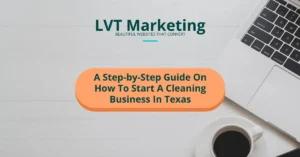How To Start A Catering Business In Texas: A Step-by-Step Guide

Ever considered firing up your culinary passions into a full-blown catering business within the vibrant and diverse food industry of Texas? We’ve been in those same shoes, exploring the idea and realizing just how much careful planning it demands.
Truth is, understanding things like proper licensing can be quite daunting. That’s why we’ve curated this comprehensive guide taking you step-by-step through all the key details including developing a solid catering business plan, securing necessary permits, creating effective promotional strategies, and so much more.
Eager to take your gastronomic dreams to soaring heights? Well then, let’s dig right in!
Key Takeaways
- The key legal considerations for starting a catering business in Texas include choosing the proper business entity, obtaining licenses and permits, ensuring health and safety compliance, obtaining catering business insurance, and hiring and managing employees.
- Important steps for obtaining licenses and permits in Texas include contacting the local county clerk’s office, getting a local business license, obtaining a catering permit, acquiring food safety certification, and ensuring approval from your city or county before applying for a catering certificate.
- Starting a catering business in Texas requires developing a well-thought-out business plan, registering as an LLC, obtaining necessary licenses and permits including food safety certification, securing catering business insurance to protect against liability risks. Additionally, promoting the business through various channels such as creating a professional website and engaging with potential clients on social media is crucial for success.
Ready to Get That Beautiful Website You’ve Always Wanted?
Legal Considerations for Starting a Catering Business in Texas
When starting a catering business in Texas, there are several legal considerations to keep in mind. These include choosing the proper business entity, obtaining licenses and permits, ensuring health and safety compliance, obtaining catering business insurance, and hiring and managing employees.
Choosing the proper business entity
To start your catering business in Texas, you must pick the right type of company. This is a key legal part. Some choose to be sole ownerswhile others go for partnerships or LLCs.
You need to think about what fits best for your catering business. Submitting an LLC application to the Texas Secretary of State is one way if that’s your choice. Keep in mind, each type has its own rules and perks so take your time before deciding.
Obtaining licenses and permits
We can help you get your catering business off the ground in Texas with some important steps. Here is a list of all the things you need to do:
- Contact the local county clerk’s office. They will give you all the help and data about what licenses and permits your new catering business needs.
- Get a local business license. You need this to start a catering company.
- Get a catering permit, so you can serve food at events.
- Go for food safety certification. You have to show that your food preparation is safe and clean.
- Plan to sell drinks? Make sure you get either an RM or MB mixed beverage permit.
- Don’t forget to get approval from your city or county before applying for a catering certificate.
- Finally, make sure that all permissions, permits, and approvals are in place before starting your successful catering business.
Ensuring health and safety compliance
Starting a catering business in Texas means we need to meet some health and safety rules. Let’s check each item on this list:
- Follow Texas Food Establishment Rules. Texas Department of State Health Services made these rules. They tell us how to run food services.
- Get approved by the health department. They will inspect our place of work for the catering service.
- Train staff in food handling and safety. Everyone who works with us must know how to handle and serve food safely.
- Use safe and clean cooking equipment. This helps prevent bad things, like sickness, from happening.
- Understand FDA rules for food businesses. This ensures we follow all the right steps when dealing with food items.
- Always clean after cooking or serving food. It keeps the work space clean and safe.
- Get certified in food safety if required by local laws or guidelines.
- Offer safe and healthy meals at all times.
Obtaining catering business insurance
One important step in starting a catering business in Texas is obtaining catering business insurance. This insurance is crucial for protecting your company from liability and other risks.
It helps cover costs if something goes wrong, like a customer getting sick from the food or damage occurring at an event. Make sure to understand the vendor liability insurance requirements for catering businesses in Texas to ensure that you have the right coverage.
By obtaining this insurance, you can have peace of mind knowing that your business is protected against potential financial losses and legal issues.
Hiring and managing employees
When starting a catering business in Texas, it’s important to consider hiring and managing employees. This involves choosing the right business entity and obtaining the necessary licenses.
Remember to double-check licensing requirements with your local zoning office before hiring employees. The requirements for hiring and managing staff may vary depending on your location in Texas.
To learn more about this topic, you can refer to “The Ultimate Guide to Starting a Home-Based Catering” which provides detailed informationon hiring and managing employees for a catering business in Texas.
Ready to Get That Beautiful Website You’ve Always Wanted?
Step-by-Step Guide to Starting a Catering Business in Texas
To start a catering business in Texas, follow these steps: develop a catering business plan, register an LLC, obtain necessary licenses and permits, secure food safety certification, obtain catering business insurance, and promote the business.
Developing a catering business plan
To start a catering business in Texas, the first step is to develop a well-thought-out business plan. This plan will serve as your roadmap and outline all the important details of your catering business.
It should include information about your target market, menu options, pricing, marketing strategies, and financial projections. By creating a thorough and detailed business plan, you will have a clear direction for your catering venture and be better prepared to navigate challenges along the way.
So take the time to carefully craft your business plan before moving on to the next steps in starting your catering business in Texas.
Registering an LLC in Texas
To start a catering business in Texas, it’s important to register as a Limited Liability Company (LLC). This legal structure offers liability protection and tax benefits. To form an LLC, you need to choose a unique name for your business and file the necessary paperwork, known as Articles of Organization.
It’s also important to prepare a certificate of formation. Registering an LLC can be done by following a step-by-step guide or using a free resource that simplifies the process. By registering as an LLC, you can ensure that your catering business is properly recognized and protected under Texas law.
Obtaining a business license and catering permit
To start your catering business in Texas, you need to obtain a business license and catering permit. Here are the steps you need to follow:
- Research the specific licensing requirements for your area: Each city or county may have its own licensing requirements for operating a catering business. Contact your local zoning office to find out the specific licenses you need.
- Submit an application for a business license: Once you know the type of license you need, submit an application to the appropriate licensing authority. Make sure to include all required documents and pay the necessary fees.
- Apply for a catering permit: In addition to a general business license, you will also need a catering permit. This permit allows you to legally prepare and serve food at events and functions. Contact your local health department or regulatory agency to apply for this permit.
- Complete any required training or certifications: Depending on your location, you may be required to complete food safety training or obtain a food handler’s certificate. Check with your local health department for any additional requirements.
- Ensure compliance with health and safety regulations: As a caterer, it’s important to comply with all health and safety regulations set by your local health department or regulatory agency. This includes proper handling, storage, and preparation of food.
Obtaining food safety certification
To operate a catering business in Texas, it is important to obtain food safety certification. This certification ensures that you and your staff have the knowledge and skills to handle food safely.
In Texas, individuals need to pass a DSHS-approved certified food manager examination to become a certified food manager. This exam covers topics such as proper food handling, storage, and sanitation practices.
By obtaining this certification, you can demonstrate to your customers that you prioritize their health and safety when preparing and serving food.
Complying with food safety regulations is crucial for operating a catering business in Texas. As part of the requirements, obtaining food safety certification helps ensure that you are aware of best practices when it comes to handling and preparing food.
By passing the certified food manager examination, you show that you have the necessary knowledge to prevent contamination and maintain high standards of cleanliness in your kitchen.
Securing catering business insurance
As catering business owners, it’s important to protect ourselves and our businesses with the right insurance coverage. In Texas, you can obtain affordable and tailored business insurance from NEXT Insurance.
They offer policies specifically designed for caterers that cover things like general liability, property damage, and even liquor liability if you’re serving alcohol at your events.
Having the right insurance gives you peace of mind knowing that you’re protected in case anything unexpected happens during your catering operations. So make sure to secure catering business insurance to safeguard yourself and your business.
Promoting the business
To make your catering business known and attract customers, it’s important to promote it effectively. Start by creating a professional website that showcases your services and menus.
Use social media platforms like Facebook and Instagram to post mouth-watering photos of your dishes and engage with potential clients. Consider partnering with local event planners, wedding venues, or corporate offices who can refer you to their clients.
Attend food festivals or community events where you can offer samples of your cuisine to generate interest. Offering special promotions or discounts for first-time customers can also help attract new business.
Ready to Get That Beautiful Website You’ve Always Wanted?
Challenges and Benefits of Starting a Catering Business in Texas
Starting a catering business in Texas comes with its fair share of challenges, but also numerous benefits. Overcoming competition and meeting customer demands are two major challenges faced by catering businesses.
However, the thriving food industry in Texas provides ample opportunities for growth and profitability. Additionally, the diverse population and abundance of events in Texas offer a wide range of clientele to cater to.
Building a strong reputation and capitalizing on these advantages can lead to a successful catering business in the Lone Star State.
Overcoming competition
Competition can be tough in the catering industry, but with proper planning and strategies, you can overcome it. One important way to tackle competition is by researching and understanding your local market.
Knowing what other caterers are offering and identifying gaps or niches where you can stand out will give you an edge. Additionally, building a strong reputation through excellent customer service and high-quality food will help you attract more clients.
Don’t forget the power of networking too – connecting with event planners, wedding venues, and other businesses in your area can lead to valuable partnerships and referrals. By staying informed about your competition, delivering exceptional service, and marketing yourself effectively, you can thrive in the competitive world of catering.
Remember these important facts:
– Researching the local market helps identify gaps for your business to fill.
– Building a strong reputation through excellent customer service is key.
Meeting customer demands
To run a successful catering business in Texas, it’s important to meet customer demands. One way to do this is by developing a detailed catering business plan that outlines the types of food and services you will offer.
By understanding your target market and their preferences, you can tailor your menu and offerings to meet their needs. Additionally, staying up-to-date with current food trends and incorporating them into your menu can help attract more customers.
Providing excellent customer service is also essential in meeting customer demands. Responding promptly to inquiries, being flexible with special requests, and ensuring timely delivery or service are all ways to satisfy your customers’ needs.
Another key factor in meeting customer demands is maintaining high standards of quality and safety in your catering operation. This includes using fresh ingredients, practicing proper food handling techniques, and adhering to health department regulations.
By consistently delivering delicious and safe meals, you can build trust with your customers and create loyal clientele who will keep coming back for more.
Lastly, promoting your catering business effectively is crucial in attracting new customers while keeping existing ones satisfied. Utilize various marketing channels such as social media platforms like Facebook or Instagram to showcase mouth-watering photos of dishes from past events or highlight positive reviews from happy clients.
Offering promotional deals or discounts on certain packages can also help attract new customers who may be on the fence about trying out your services.
Building a strong reputation
To be successful in the catering industry in Texas, it’s crucial to build a strong reputation. This means providing excellent customer service and delivering high-quality food. When customers have a great experience with your catering business, they’re more likely to recommend you to others and come back for future events.
Additionally, developing relationships with local vendors and venues can also help boost your reputation. By working closely with trusted partners, you can ensure that your clients receive the best possible service at their events.
With hard work and dedication, you can establish a strong reputation in the catering industry in Texas and grow your business.
Capitalizing on the thriving food industry in Texas
Texas has a thriving food industry, making it an ideal place to start a catering business. With a diverse populationand numerous eventshappening throughout the state, there are plenty of opportunities to offer your services.
The booming restaurant scene also means that people in Texas have an appreciation for good food and are willing to try new things. By starting a catering business in Texas, you can tap into this demand and capitalize on the growing market.
Whether it’s providing delicious meals for weddings, corporate events, or private parties, there is no shortage of potential customers in the Lone Star State. So don’t miss out on this chance to be part of the exciting food industry in Texas!
Capitalizing on the diverse population and events in Texas
In Texas, there’s a diverse population with different tastes and preferences. This presents a great opportunity for catering businesses to attract a wide range of customers. You can create menus that cater to various cultural backgrounds and dietary needs.
Additionally, Texas is known for hosting numerous events like festivals, weddings, and corporate functions. By offering your catering services at these events, you can tap into a large market and reach potential clients who are looking for delicious food options.
So, take advantage of the diversity in Texas and the thriving event scene to grow your catering business!
Conclusion
In conclusion, starting a catering business in Texas requires careful consideration of legal requirements such as choosing the right business entity and obtaining licenses. Developing a solid business plan, registering as an LLC, and obtaining necessary permits are crucial steps.
Additionally, promoting your business and getting catering insurance are important for success. Remember to follow all regulations and guidelines to ensure a thriving catering business in Texas.
Ready to Get That Beautiful Website You’ve Always Wanted?
FAQs
1. How can I start a small catering business from my home in Texas?
To start a home-based catering business, you need to get a catering license in Texas. You also have to choose a name for your company and set up its structure.
2. What type of food license do I need to run my own retail food operation?
In order to run your catering business, you’ll need two main licenses: the Catering Business License and the Certified Food Handler’s License.
3. Do I require any extra permits for serving alcohol at my events?
Yes, if you plan on serving alcoholic beverages, you may also need to obtain a liquor license from the Texas Alcoholic Beverage Commission.
4. Can I use regular kitchen gear or do I require special equipment?
Running a catered event often requires specific catering equipment beyond what is usually found in most homes.
5. Do all catering companies have their setup similar to mine?
No! Just as each cooking style varies so does everyone’s way of starting a business; some caterers may operate out of professional kitchens while others may start by hosting smaller events at home.
6. After setting up everything how can people learn about my services?
Once you’re ready with supplies and licenses now comes time for marketing; promote your venture online or by word-of-mouth advertising it among friends & community groups.


